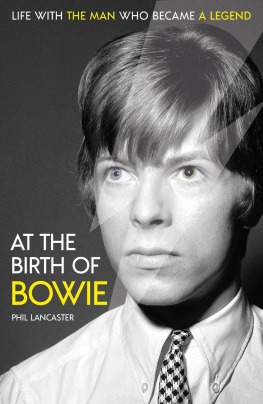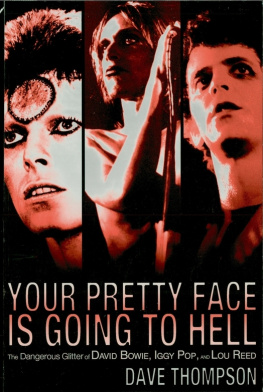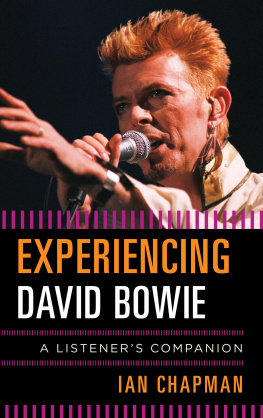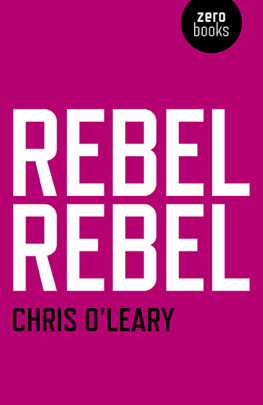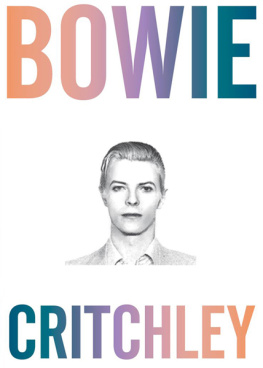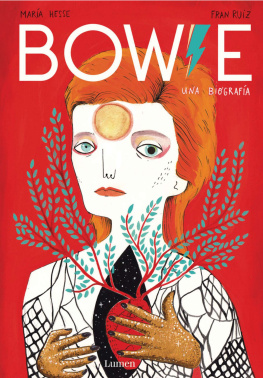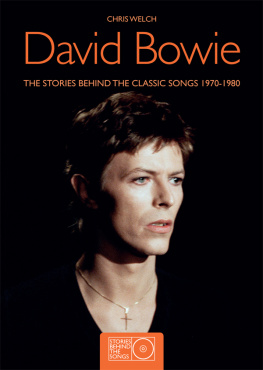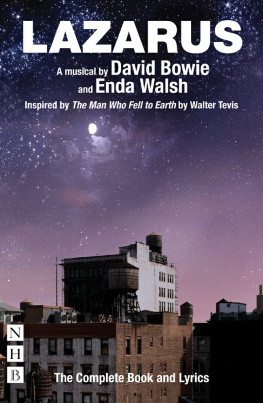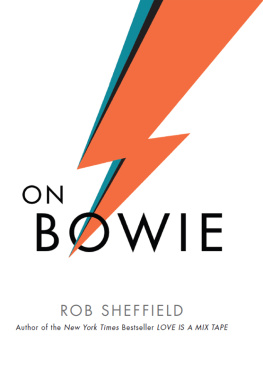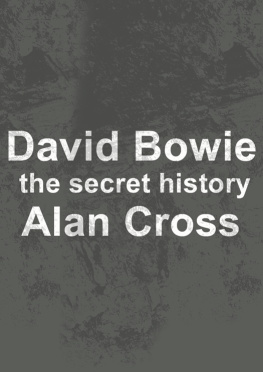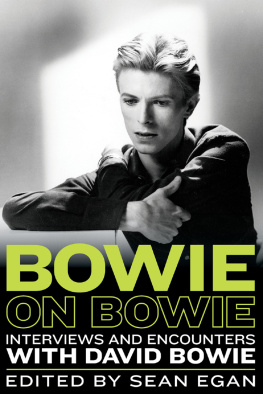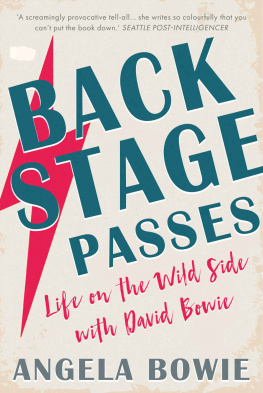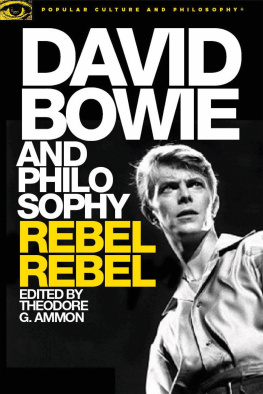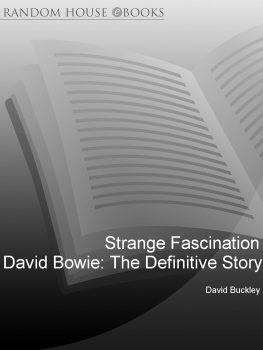HALLO SPACEBOY
THE REBIRTH OF DAVID BOWIE
HALLO SPACEBOY
THE REBIRTH OF DAVID BOWIE
DAVE THOMPSON

Copyright Dave Thompson, 2006
Published byECW PRESS
2120Queen Street East, Suite200, Toronto, Ontario, CanadaM4E 1E2
All rights reserved. No part of this publication may be reproduced, stored in a retrieval system, or transmitted in any form by any process electronic, mechanical, photocopying, recording, or otherwise without the prior written permission of the copyright owners and ECW press.
Library and Archives Canada Cataloguing In Publication
Thompson, Dave, 1960 Jan. 3
Hallo spaceboy : the rebirth of David Bowie / Dave Thompson.
ISBN1-55022-733-5
1. Bowie, David. 2. Rock musiciansEnglandBiography. I. Title.
ML420.B784T46 2006 782.42166092 C2006-900494-3
Developing editor: Jennifer Hale
Typesetting: Gail Nina
Cover design: David Gee
Text design: Tania Craan
Cover photo: Lester Cohen / WireImage.com
Color section, in order: Philippe Auliac; Philippe Auliac;
Richard Beland; Richard Beland; Fernando Aceves;
Fernando Aceves; Fernando Aceves (top and bottom); Fernando Aceves;
Fernando Aceves (top and bottom); Richard Beland; Philippe Auliac;
Richard Beland; Richard Beland; Philippe Auliac; PhilippeAuliac;
Kevin Mazur/WireImage.com
Ticket stubs courtesy: Robert Thompson (pp. 7, 64, 84);
Graham McDougall (pp. 63, 75, 150, 155, 180, 183);
Bianca Dietrich (p. 153); Simone Metge (pp. 185, 195, 212, 223, 240,
261, 262, 266, 274, 276, 279, 282)
Printing: Transcontinental
DISTRIBUTION
CANADA: Jaguar Book Group, 100 Armstrong Avenue, Georgetown, ON, L7G 5S4
UNITED STATES: Independent Publishers Group, 814 North Franklin Street, Chicago, Illinois 60610
PRINTED AND BOUND IN CANADA

CONTENTS
ACKNOWLEDGMENTS
For interviews and conversations conducted in person, by phone or via e-mail over the course of the past decade and more, all awaiting the day when they could fall into this framework, my thanks to: Carlos Alomar, Brett Anderson, Ian Astbury, Boz Boorer, Chris Carter, Billy Corgan, Peter Frampton, Lisa Germano, Dave Grohl, Iggy Pop, Lou Reed, Nile Rodgers, Mick Ronson, Tony Secunda, Robert Smith, James Stevenson, Tony Visconti, together with everybody who agreed to speak with me, but asked that they not be identified.
Grateful acknowledgments also go out to everybody at ECW, to Amy Hanson and Jo-Ann Greene, and to everybody else who helped bring the beast to life: Anchorite Man, Bateerz and family, Blind Pew, Mrs. B East, Ella and Sprocket, Gaye and Tim, Gef the Talking Mongoose, the Gremlins who live in the furnace, JD, K-Mart and Snarleyyowl, Geoff Monmouth, Naughty Miranda, Nutkin, Pointy Ghost Face, Sonny, a lot of Thompsons and Neville Viking.
Finally, two dedications: to Sherrill Chidiac, my agent for ten great years, but who passed away just as this book reached its final phase; and to the boy who wrote Cygnet Committee, and who still sounds like he meant it. This book would not have happened without the two of you.
INTRODUCTION
When the covers closed on the first volume of this biography, Moonage Daydream, back in 1987, it would have been a brave soul indeed who prophesied a second volume. Never Let Me Down, Bowies album that year, was almost universally hammered, not because it was a bad record, but because it was the wrong one for the time and place in which it was released. Three years before the end of the decade, rock was in desperate need of fresh direction. The firestorms that had shaken and shaped it through the early 1980s had long since passed; worse than that, they had been utterly subverted, absorbed into the body of an entertainment industry that valued everything for which rock n roll had once been anathema.
Hindsight offers any number of flash points, from the British New Romantic crowd dancing with royalty at sundry showbiz galas, through to Live Aid, the single most successful charity event in rock history (and the single most damaging blow to the notion that rock stands outside the societal norm).
True, there were bands who didnt play at Live Aid, and who wouldnt have if theyd been asked there were even one or two, led by such (then) underground concerns as Chumbawamba and the Red Hot Chili Peppers, who spoke out against the notion that a day of live music could suddenly reverse the western worlds culture of greed and selfishness. But bands such as these operated so far below the mainstream radar that they could only preach to the same handful of listeners theyd always spoken to. To the public in general, the rock rebellion had finally thrown in the towel and now it could reap the rewards of its common sense.
Shocked and shaken by their elevation to a level of royalty that had hitherto been afforded only to the true aristocrats of rock the Stones and ex-Beatles, Cliff and Dead Elvis performers that were scarcely worthy of tying John Lennons shoelaces were suddenly pronouncing on all of the worlds faults and failings, or else subverting any urge to rock the boat that they might have entertained, and delving deep into the soft, gooey underbelly of mass entertainment with records that might have made all the right noises in all the right places, but actually said and did nothing. Worthless platters from pointless prognosticators.
David Bowie had already made a couple of albums that fell into that void, although one (1983s Lets Dance) was so successful that its manifold failings remain a closely guarded secret more than twenty years on, while the other (1984s Tonight) is usually best ignored. Besides, every artist should be permitted the odd dodgy stretch, where the music and the mind fall out of step with one another. But surely enough had occurred in the years since then, both personally and in the wider world of music, to stir Bowie back to some form of outrageous opinion? Rock was looking for leaders, and, as he had done so often before, Bowie was expected to be among them.
Instead, he delivered Never Let Me Down, an album that, while vastly superior to Tonight and eternally more enjoyable than Lets Dance, nevertheless completed a trilogy as solid and unmistakable as either the Ziggy/Aladdin/Dogs triumvirate of the glam era, or the Low/Heroes/Lodger lineup of the late 1970s. The problem was, this one was as brutally out of synch with its times as those albums had been brilliantly aware of theirs (although, let us not forget, both Aladdin Sane and Diamond Dogs were given a rough ride by the media, while the bulk of Lodger remains better in theory than in the actual execution).
Much of the credit for Never Let Me Downs renaissances, such as they were, must go to Bowies choice in collaborators. David Richards, Erdal Kizilcay and Carlos Alomar were familiar names from the past, of course, each well aware of precisely what the boss man wanted, and how hed want it done. The wild card, however, was Peter Frampton, the second most famous man to have attended Beckenham Secondary School.
Frampton had been a couple of years behind Bowie at school, but he was a couple of years ahead of him in the stardom game. Frampton had been a chart topper with The Herd while Bowie was still stringing out the sixties in a variety of novelty voices; he was a stadium filler with Humble Pie while Bowie played the folk clubs and bars; and a bona fide superstar while Bowie played at provincial Godhead. But by the early eighties, Frampton had in commercial terms at least fallen on hard times, withdrawing from the front line to concentrate on his family and homelife.
Next page

